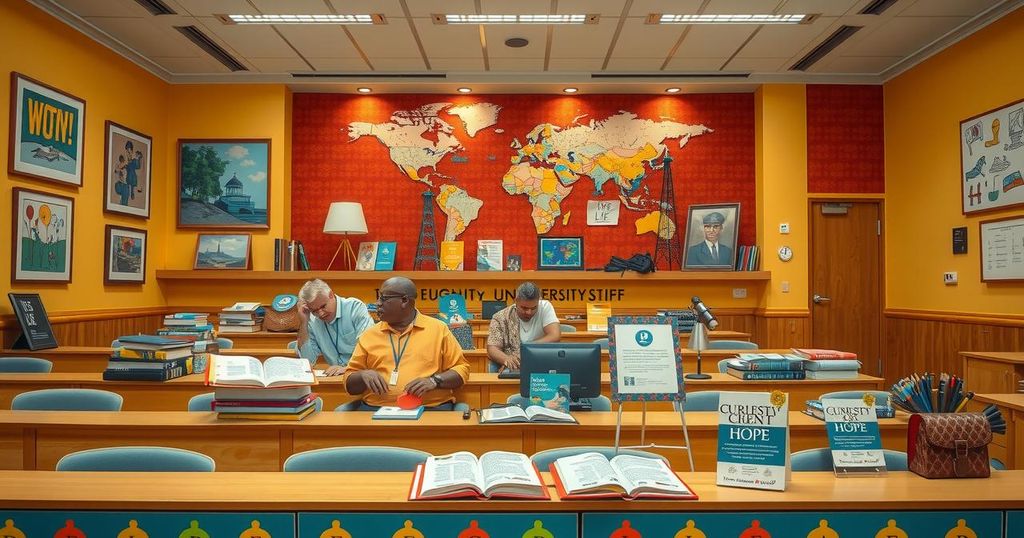Global news
ABD, ABDALMAJID KATRANJI, AHMED AL - SHARAA, ASIA, ASSAD, ATLANTIC COUNCIL, CIVIL WAR, CONFLICT, HAY, HELMETS, HUMANITARIAN CRISIS, IDLBI, IDLIB, MICHIGAN, MICHIGAN STATE UNIVERSITY, MIDDLE EAST, REFUGEE CRISIS, SYRIA, TAHRIR AL - SHAM, UNIVERSITY OF MICHIGAN, WAR
Leila Ramsay
0 Comments
Weiser Diplomacy Center Discusses Syria’s Reconstruction Challenges and Progress
The Weiser Diplomacy Center at the University of Michigan hosted a discussion featuring Qutaiba Idlbi and Dr. Abdalmajid Katranji on the reconstruction of Syria post-civil war. Key topics included the impact of the regime change, the significance of civic institutions in rebuilding, and the detrimental effects of U.S. sanctions. The speakers stressed the importance of continued U.S. involvement and the need for authentic reporting on the situation in Syria.
On Thursday afternoon, the Weiser Diplomacy Center at the University of Michigan hosted a discussion on the post-civil war reconstruction in Syria. The speakers, Qutaiba Idlbi from the Atlantic Council and Dr. Abdalmajid Katranji from Michigan State University, addressed the impacts of the fourteen-year civil war, the current state-building efforts by the newly established Syrian government, and the various challenges facing the country during its reconstruction process.
Following the collapse of Bashar al-Assad’s regime on December 8, 2024, Ahmed al-Sharaa, also known as Abu Mohammed al-Julani, took leadership. Al-Julani heads the group Hay’at Tahrir al-Sham, which is primarily based in Idlib. This transition marks a significant shift amidst the ongoing turmoil in Syria.
Idlbi highlighted the extensive damage inflicted by the civil war, noting a significant brain drain due to mass emigration of educated individuals. “Half of Syria has left the country,” Idlbi asserted, emphasizing the unprecedented nature of the displacement, comparable only to the migrations observed after World War II.
Despite the challenges, Idlbi conveyed a sense of optimism among Syrians about the end of authoritarian rule under Assad. He shared that, “They are still high on joy and happiness that they finally got their country back,” indicating a profound desire for rejuvenation amid adversity.
While Sharaa has faced Western criticism for alleged Al-Qaeda affiliations, both Katranji and Idlbi contested this claim. They emphasized that Sharaa has distanced himself from Al-Qaeda and is actively combating extremist groups, further asserting that reconstruction efforts have fostered civic engagement in areas like Idlib, exemplified by organizations such as the White Helmets.
Katranji’s personal accounts provided a detailed contrast between the governance experienced in HTS-controlled Idlib and the challenges faced in Assad’s region. “There was no structure… because there was no civil brigade,” he noted, underscoring the difficulties encountered while attempting to provide aid after natural disasters in different areas.
Idlbi suggested that the extended civil war inadvertently allowed Syrians to develop self-governing institutions, a luxury not afforded to Iraqis during the U.S. occupation. He stated, “In Syria, there was that gap where Syrians were able to come together. They already started nation building.”
Despite past U.S. failures, Idlbi expressed belief in a constructive American role in Syria’s reconstruction, asserting that support should not amount to dictation. He maintained, “They have built the Syrian Dream, which I believe is very similar to the American Dream.”
Katranji addressed the implications of U.S. sanctions on Syria under the Caesar Syria Civilian Protection Act, calling for their expedited removal and urging a global consensus on this critical issue. He warned against prolonged inaction, stating, “If you wait too long, then another vacuum will be created.”
Emphasizing proper international engagement, Katranji noted the urgency of addressing sanctions, especially since other international entities like the European Union and the United Nations have advocated for easing them.
Senior Razaan Killawi, co-president of Students Organize for Syria, expressed gratitude for the informative talk and encouraged students to engage more deeply with Syrian perspectives and media coverage. “I think it’s really meaningful when (students) can come to events led by Syrians,” Killawi stated, underscoring the importance of authentic information amidst disinformation challenges.
The discussion at the Weiser Diplomacy Center illuminated crucial issues regarding Syria’s reconstruction following the prolonged civil war. The speakers, Idlbi and Katranji, reinforced the importance of civic engagement in rebuilding efforts and articulated hope for a brighter future under new leadership. They advocated for easing U.S. sanctions to support the recovery, while highlighting the significance of authentic narratives from on-the-ground reporters. The dialogue underscored the resilience of the Syrian people and their capacity to rebuild despite substantial challenges.
Original Source: www.michigandaily.com




Post Comment